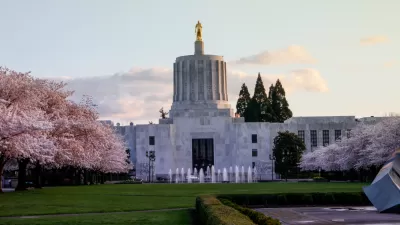The Waxman-Markey bill doesn't apportion the revenues received from the sale of carbon credits, a key issue yet to be decided. Renewable electricity, greener cars, low carbon fuels, and a carbon reduction goal are all parts of this comprehensive bill
"The draft measure, written by Representatives Henry A. Waxman of California and Edward J. Markey of Massachusetts, sets a slightly more ambitious goal for capping greenhouse gases than Mr. Obama's proposal.
The bill would require every region of the country to produce a quarter of its electricity from renewable sources like wind, solar and geothermal by 2025.
The bill also calls for modernization of the electrical grid, production of more electric vehicles and significant increases in efficiency in buildings, appliances and the generation of electricity.
But the Waxman-Markey proposal does not address two of the most difficult issues in any global warming plan: the distribution of pollution allowances and a specific timetable for achieving emissions reductions. It also does not say how most of the tens of billions of dollars raised from auctioning pollution permits would be spent, or whether the revenue would be returned to consumers to compensate for higher energy bills. Those matters have been left to negotiations,
Under Mr. Obama's plan, roughly two-thirds of the revenue from pollution permit auctions would be returned to the public in tax breaks. Some members of Congress from both parties want to see all the revenue from any carbon-reduction plan returned to the public in some form."
A coalition of business and environmental groups, the United States Climate Action Partnership, welcomed the measure as a "strong starting point" for addressing greenhouse gas emissions and said it had incorporated many of its recommendations."
From Congressional Discussion Draft Summary:
"One key issue that the discussion draft does not address is how to allocate the tradable emission allowances that restrict the amount of global warming pollution emitted by electric utilities, oil companies, and other sources. This issue will be addressed through discussions among Committee members."
Thanks to Ned Ford
FULL STORY: Democrats Unveil Global Warming Bill

Planetizen Federal Action Tracker
A weekly monitor of how Trump’s orders and actions are impacting planners and planning in America.

Chicago’s Ghost Rails
Just beneath the surface of the modern city lie the remnants of its expansive early 20th-century streetcar system.

San Antonio and Austin are Fusing Into one Massive Megaregion
The region spanning the two central Texas cities is growing fast, posing challenges for local infrastructure and water supplies.

Since Zion's Shuttles Went Electric “The Smog is Gone”
Visitors to Zion National Park can enjoy the canyon via the nation’s first fully electric park shuttle system.

Trump Distributing DOT Safety Funds at 1/10 Rate of Biden
Funds for Safe Streets and other transportation safety and equity programs are being held up by administrative reviews and conflicts with the Trump administration’s priorities.

German Cities Subsidize Taxis for Women Amid Wave of Violence
Free or low-cost taxi rides can help women navigate cities more safely, but critics say the programs don't address the root causes of violence against women.
Urban Design for Planners 1: Software Tools
This six-course series explores essential urban design concepts using open source software and equips planners with the tools they need to participate fully in the urban design process.
Planning for Universal Design
Learn the tools for implementing Universal Design in planning regulations.
planning NEXT
Appalachian Highlands Housing Partners
Mpact (founded as Rail~Volution)
City of Camden Redevelopment Agency
City of Astoria
City of Portland
City of Laramie




























